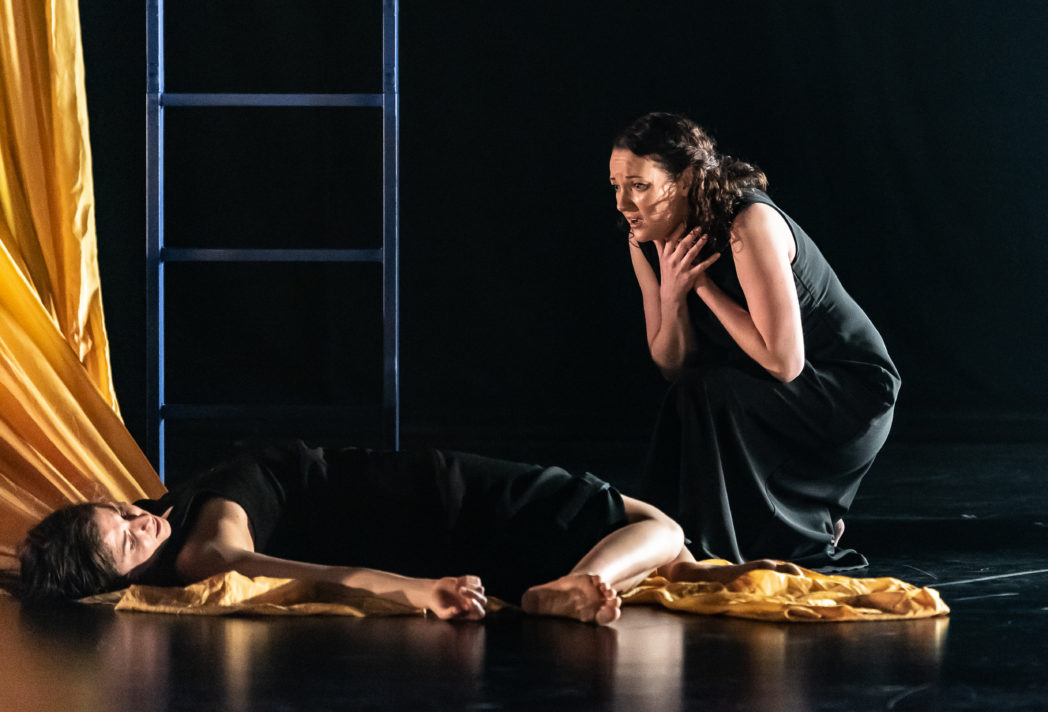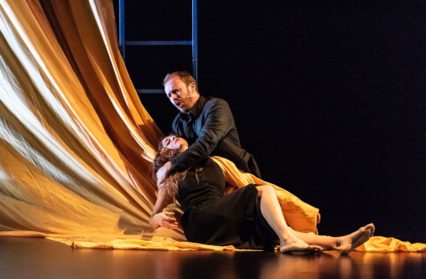David Truslove reviews the Passion UK premiere at The Anvil, Basingstoke, Co-production from Music Theatre Wales & National Dance Company Wales with London Sinfonietta & EXAUDI
Pascal Dusapin – Passion
UK premiere at The Anvil, Basingstoke, Hampshire, 11th October 2018
Co-production from Music Theatre Wales & National Dance Company Wales with
London Sinfonietta & EXAUDI
A Dance-Opera to a libretto by the composer with an English translation by Amanda Holden, conducted by Geoffrey Paterson
Michael McCarthy & Caroline Finn – Co-Directors; Simon Banham – Designer; Joe Fletcher – Lighting; Sound Intermedia
Her – Jennifer France; Him – Johnny Herford
Asked to name any contemporary French composer and chances are you’ll come up with Pierre Boulez or Henri Dutilleux. Think again – because those grandees are no longer with us. After some head scratching you might suggest any one of a trio of post-war figures such as Philippe Manoury, Tristan Murail or, a name until recently entirely new to me, Pascal Dusapin.
Michael McCarthy, Artistic Director of Music Theatre Wales, has been fascinated by Dusapin for some time largely, I suspect, because stage works occupy the centre of this composer’s creative imagination. Influenced early on by Varèse and Xenakis, Dusapin (born 1955) has embraced elements of folk and jazz to forge an eclectic modernistic style. His Passion dates from 2008 and was premiered that year in Aix-en Provence. This first UK presentation is a combined venture between Music Theatre Wales, National Dance Company Wales, the London Sinfonietta and singers from EXAUDI.

It’s a haunting meditation on the Orpheus and Eurydice myth (so inspirational for Monteverdi, Gluck, Offenbach and Birtwistle) and conceived as a dance-opera where singing and movement carry an equal share of the ‘narrative’. But this single act traversal of two tormented souls is no straightforward linear account. Its ancient narrative is reassembled to give ‘voice’ to Eurydice, Dusapin readdressing the couple’s relationship as a reflection of society’s fixation on difference and identity – concepts that have preoccupied the French philosopher Gilles Deleuze (1925-1995) who Dusapin much admires. Passion is principally a psychological portrait of separation and loss, pain and desire, an unconventional reimagining that poses more questions than answers, and makes a fascinating enquiry into the very nature of death. On another level it’s what Dusapin has recently described as a “body language of love through music”.
Its principal performers are two solo singers, Johnny Herford as ‘Him’ (Orpheus) and Jennifer France as ‘Her’ (Eurydice) and five dancers, supported by the chamber forces of the London Sinfonietta and the vocal ensemble EXAUDI. Dusapin’s fine ear for sonorities (there’s also an offstage harpsichord and Arabic oud to create their own special atmosphere) and measured pacing ensures a richly elegiac and darkly intense experience. Thanks to the artful collaboration between co-directors Michael McCarthy and Caroline Finn, singing and movement meld seamlessly, languorous and agitated gestures (representational and abstract) carefully articulate mood and feeling through individual expression and bonded interaction. At times, within the perpetual movement, it’s hard to know when singing ends and dance begins, so closely are both sets of performers entwined. The semi-lit stage is mostly bare except for a ladder (a link to the Underworld) and a huge yellow drape (indicative of the sun) around which the action plays out.
The singers respond to the score with stunning assurance – Jennifer France demonstrably at ease with Dusapin’s soaring lines and, whether half way up the ladder or held aloft by the dancers, able to pluck notes out of the ether, unfazed by a part originally written for Barbara Hannigan. No less eloquent in voice and movement is Johnny Herford, whose high baritone brings warmth and subtlety of expression to match the radiance of his dead lover. (With the absence of surtitles, diction could occasionally be improved.) Offstage, briefly exotic contributions from EXAUDI make clear why they are one of the finest vocal ensembles today, and below stage Geoffrey Paterson draws exquisite colours from the London Sinfonietta, illuminating the work’s wonderfully diverse scoring. Among numerous felicitous passages is a beguiling trio for bassoon, horn and trumpet (bringing echoes of Stravinsky’s The Rite of Spring) and a fragment of plucked strings and harp delicately reminiscent of Monteverdi.
This fastidiously prepared and thought-provoking production continuously holds the ear and eye for its eighty-five-minute span. In this, there can be no better introduction to Dusapin; its UK tour continues in Cardiff on 23 October, and then on to Snape, Salford and Mold.
Header image: Nikita Goile (Dancer) and Johnny Herford (Him). Passion photo credit: Clive Barda
You might also like…
Nigel Jarrett visits St David’s Hall to witness a St Valentine’s Day performance of pulsating rhythms, cyclical chords, and shifting harmonies, in Steve Reich’s Music for 18 Musicians by London Sinfonietta.
David Truslove is a regular contributor to Wales Arts Review.











